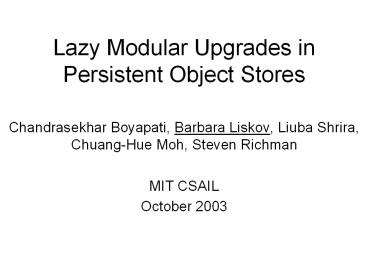Lazy Modular Upgrades in Persistent Object Stores - PowerPoint PPT Presentation
Title:
Lazy Modular Upgrades in Persistent Object Stores
Description:
Title: Preventing Upgrade Errors Subject: OOPLA 2003 Author: Barbara Liskov Last modified by: Chandrasekhar Boyapati Created Date: 10/24/2003 4:47:20 PM – PowerPoint PPT presentation
Number of Views:116
Avg rating:3.0/5.0
Title: Lazy Modular Upgrades in Persistent Object Stores
1
Lazy Modular Upgrades in Persistent Object Stores
- Chandrasekhar Boyapati, Barbara Liskov, Liuba
Shrira, Chuang-Hue Moh, Steven Richman - MIT CSAIL
- October 2003
2
Persistent Object Store
- Stores objects with methods
- Objects belong to classes
- Classes implement types
Persistent Root
3
Transactions
- Objects are accessed within transactions
- Transactions mask concurrency and failures
Persistent Root
Client 1
Client 2
4
Upgrades
- Upgrades are needed to
- Correct errors
- Improve performance
- Meet changing requirements
5
Outline
- Defining upgrades
- Upgrade execution
- Upgrade modularity conditions
- Performance
6
Defining Upgrades
- Upgrade must preserve persistent state
- E.g., set implementation changes from vector to
hash table - A class-upgrade is
- ltold-class, new-class, TFgt
- TF old-class ? new-class
- TF changes representation of objects
- System preserves identity
7
Completeness
- Upgrades can be
- Compatible
- Incompatible
- An upgrade is a set of class-upgrades
- must contain all class-upgrades needed to
maintain type correctness
8
System executes Upgrades
- Requires transforming all old-class objects
- Goal dont interfere with applications
- Dont stop the world
- Goal be efficient in space and time
- Dont copy the database or use versions
- Goal be expressive
- Dont limit expressive power of TFs
9
Solution Lazy, Just in Time
- Applications continue to run
- Objects are transformed just before first use
- Later upgrades run in parallel with earlier ones
- If x has two pending transforms, they run in
upgrade order
10
How System Works
- When application accesses x
- Interrupt the application
- Run earliest pending transform for x
- Each transform runs in its own transaction
- Application continues after transform commits
- Transforms can be interrupted too
11
Example
- U1 TF(x) A1 TF(y) A2
- U1 is installed
- A1 starts to run, accesses x
- TF(x) runs and commits
- A1 continues and commits
- A2 starts to run, accesses y
- TF(y) runs and commits
- A2 continues and commits
12
Example
- U1 TF(x) A1 TF(y) A2
- U1 is installed
- A1 starts to run, accesses x
- TF(x) runs and commits
- A1 continues and commits
- A2 starts to run, accesses y
- TF(y) runs and commits
- A2 continues and commits
- Problem suppose TF(y) accesses x
13
Modular Reasoning
- Want to support modular reasoning
- Programmer can reason about TF as if it were an
extra method of the old-class - Programmer can assume same old-class interfaces
and invariants
X
TF
14
Desired Semantics
- Upgrades appear to run when installed
- Serialized before all later application
transactions - Upgrades appear to run in upgrade order
- Within an upgrade, transforms run as if each was
the first to run
15
Order within an Upgrade
- Consider x and y due to be upgraded
- If TF(y) uses x (transitively) then if TF(x)
TF(y), this must have same effect as TF(y)
TF(x)
Y
X
16
Ensuring Correct Behavior
- Based on encapsulation An object must
encapsulate every object it depends on
X
- A TF is well-behaved if it uses only encapsulated
sub-objects
17
Approach
- Analyze TFs
- Usually they will be well-behaved
- Otherwise notify user
- User can use triggers to control order
- Or, we maintain versions
Z
X
Y
18
Performance
- Implemented in Thor
- Analyzed overhead
Clients
App
App
FE
FE
OR
OR
19
Baseline Overhead
20
Transform Overhead
Time per object (µs) T1 T2b
Transform 11.3 11.5
Commit 19.9 1.0
21
Conclusions
- Correctness conditions for any upgrade system
- Support modular reasoning
- Our lazy implementation approach
- Correct and efficient
- Future work upgrades in distributed systems































